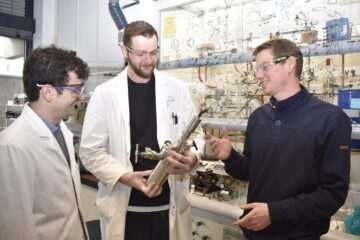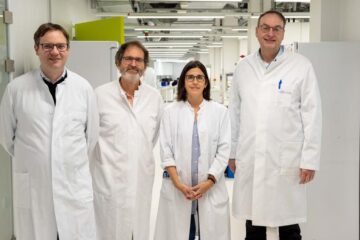Unique Results from Swedish Study of HIV vaccine

Over 90 per cent of the subjects in the phase 1 trials developed an immune response to HIV. ”Never has such a good result been seen with a vaccine of this type,” says Professor Eric Sandström, Chief Physician at Karolinska University Hospital.
A vaccine developed by SMI scientists has now undergone the first clinical study on healthy individuals in Sweden in order to examine its safety and different methods of administration. The vaccine is what is known as a genetic vaccine, which uses parts of the virus DNA to stimulate the rapid endogenous production of the proteins for which the injected DNA codes.
The trial subjects were vaccinated on three occasions with this vaccine using a needle-free method of injection. In order to enhance the effect, the researchers also gave the subjects a fourth dose of a vaccine in which parts of the HIV virus DNA had been integrated into another virus (vaccinia = the cowpox virus). This vaccine-based HIV vaccine is produced by the USA’s National Institutes of Health and was donated for use in this Swedish study.
“Our vaccine is designed in such a way that it’s able to protect against many of the circulating HIV types in Africa and the West,” says Professor Britta Wahren at the SMI/KI.
Over 90 per cent of the trial subjects developed an immune response to HIV, and the vaccines have been tolerated well.
Data from the study will be presented at the four-day HIV vaccine conference in Amsterdam starting 29 August under the heading “Multigene, multiclade HIV-1 plasmid DNA prime and MVA boost is safe and highly immunogenic in healthy human volunteers”.
Scientists now hope to follow up the Swedish study with a larger phase 1 – phase 2 study in Tanzania, planned to commence this autumn, in order to corroborate the Swedish results on African subjects and to help train Tanzanians to carry out parts of the study, including sophisticated laboratory examinations, on site.
The project is being led by KI professors Gunnel Biberfeld and Britta Wahren at the SMI and Eric Sandström at Karolinska University Hospital.
SMI has been running major projects in the HIV field since 1986 with the support of Sida/SAREC, the EU’s 5th Framework Programme, the Swedish Research Council, Karolinska Institutet, and Karolinska University Hospital. Over the past few years, the projects have tended more and more towards developing a vaccine for the prevention of HIV.
Data from the study will be released at the conference presentation on 30 August.
Media Contact
More Information:
http://www.ki.seAll latest news from the category: Health and Medicine
This subject area encompasses research and studies in the field of human medicine.
Among the wide-ranging list of topics covered here are anesthesiology, anatomy, surgery, human genetics, hygiene and environmental medicine, internal medicine, neurology, pharmacology, physiology, urology and dental medicine.
Newest articles

Efficient, sustainable and cost-effective hybrid energy storage system for modern power grids
EU project HyFlow: Over three years of research, the consortium of the EU project HyFlow has successfully developed a highly efficient, sustainable, and cost-effective hybrid energy storage system (HESS) that…

Safer alternative for an explosive reaction
The chemical industry has been using a reaction with explosive chemicals for over 100 years – now Mülheim scientists have discovered a safer alternative. The Ritter Group of the Max…

How immune cells communicate to fight viruses
Chemokines are signalling proteins that orchestrate the interaction of immune cells against pathogens and tumours. To understand this complex network, various techniques have been developed to identify chemokine-producing cells. However,…





















